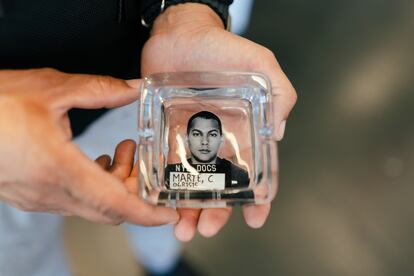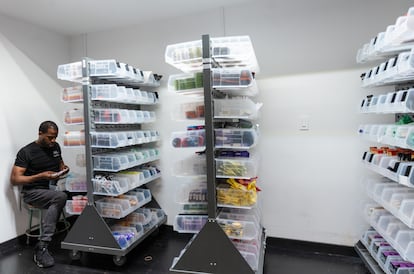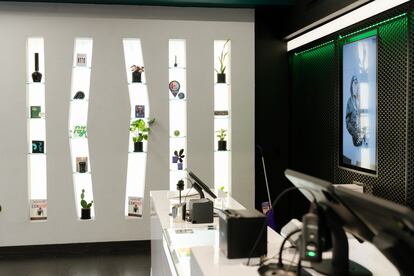The first time a police officer slammed Coss Marte’s face into a sidewalk, he was 13 years old. It was the nineties in the Lower East Side, a neighborhood in the south of Manhattan that at that time was flooded with drugs and, therefore, with police. Marte had just sold two bags of marijuana to a friend and they were walking down the street, talking and smoking, when the police stopped them. “I didn’t feel afraid,” she remembers. That arrest — the first of “ten in total” — marked the beginning of a decade-long career as a marijuana and cocaine trafficker. A multimillion-dollar business that placed him in the DEA’s sights and that at 23 years old led him to prison for four years.
Today, just three blocks from that corner where he was first arrested more than two decades ago, Marte sells marijuana legally. He’s been doing it since October of last year, when he opened ConBud, his own cannabis dispensary. Is one of the 132 currently operating in New York, after the state legalized recreational marijuana use in March 2021. ConBud exists through a state cannabis licensing program focused on individuals who have previously been convicted for marijuana-related crimes. These licenses — called CAURDs — are reserved for applicants from “communities disproportionately affected” by cannabis prohibition, the vast majority of whom are African Americans and Latinos. Regarding the latter, the law signed in 2021 even specifies some nationalities: “Hispanics of Mexican, Puerto Rican, Dominican, or Cuban origin.”
They are second chances for people like Marte, who suffered firsthand the abuses committed during the war on drugs when, at the end of the last century, authorities focused their efforts on the possession and distribution of marijuana. Like him, thousands of Latinos were arbitrarily detained due to their skin color and appearance, and excessively imprisoned. In New York City alone, between 1997 and 2006, 112,000 Latinos were imprisoned for possessing small amounts of marijuana. This is 31% of the arrests during that period, even though Latinos only represented 27% of the city’s population at the time. according to data from the ACLU of New York. Mars was one of those thousands.
Of the corner to earn a million dollars a year
Marte, whose mother emigrated from the Dominican Republic while pregnant with him, was born and raised in a Lower East Side governed by the owners of the corners, the points or corners where the drugs moved. At 11 years old, he already smoked marijuana. “In this neighborhood, a lot of people made a lot of money selling drugs. There were multi-million dollar corners, where people lined up to buy, and I lived on them. So as a kid, seeing 20 or 50 people lining up to catch was crazy. For me, that was the image of success,” says Marte. So, as a teenager, he “surrendered himself to the streets.”
He started selling marijuana inside a neighborhood warehouse, at the intersection of Broome and Eldridge streets. Eventually, he inherited the corner from its previous owner and threw himself into it. “It did not stop. I was in that corner 24 hours a day, I slept there,” she remembers. In the early 2000s, with the gentrification of the neighborhood, Marte saw how his product went from selling “for $20 to almost $100.” His profits multiplied and the business took off.
He no longer only sold on the corner of Broome and Eldridge; He did it all over the city with his own home delivery service. Marijuana and cocaine on demand, 24 hours a day, seven days a week. The orders he received were so many that he had seven cell phones to be able to process all the orders: “The cell phones didn’t stop ringing. “Sometimes he would pick up calls on two phones at once while two others were ringing.” At just 19 years old, Marte says, he was already earning a million dollars a year.
Until 2009. In March of that year, Marte was arrested in the Bronx, in front of one of the three apartments he had in the city. According to a report from the Office of the Special Narcotics Prosecutor for the City of New York, authorities had tapped one of the phones at his business as part of an investigation, and when they arrested him, he had that same cell phone with him. A search of his residence found approximately two pounds of cocaine, the report continues.

Marte was sentenced to seven years in prison, although he was released after four. That last arrest changed something in him. He realized that he couldn’t keep up with the pace he was going. “I fell into the box. I was in solitary confinement, in a cell for 24 hours, alone. And then I started thinking, you know? I read the Bible and changed my mind,” he recalls. “My son, who visited me, also had an influence. When I was arrested, he was almost 2 years old. When I came out I was 6. I had to have another future for him, I didn’t want to go back to what I was doing before.”
In prison, Marte also received a warning that would change his life completely. He was very overweight and the prison doctors warned him that if he did not modify his lifestyle, it could end up killing him. That’s how, even behind bars, he conceived a plan to lose weight and get in shape. In just six months he lost 70 pounds (about 30 kilos) and began training other inmates. When he was released in March 2013, he professionalized the method and a year later officially launched WithBody, an exercise program inspired by his time in prison. In 2016, he opened the doors of a gym with the same name, a facility where the dispensary is also located today. ConBud.
Repairs
– After everything you’ve been through, did y
ou ever think you’d sell marijuana legally?
– hell no (no way, in Spanish).
Marte remembers that when he found out that the city was going to offer cannabis licenses to former inmates like him, he thought, “This law was written for me, to give me a second chance.” One of the requirements to apply for a CAURD license was to have had a profitable business for at least two years, which he already had with the ConBody gym. So he applied for the license in 2022 and the following year he received the green light to open ConBud.
According to data from the New York Office of Cannabis Management, the State received more than 900 applications for CAURD licenses between August 2022, when the application period opened, and September 2023. Since then, 463 applicants have obtained a cannabis license. this type or at least a provisional authorization. Of the 132 dispensaries in the State, 124 operate thanks to this program, 94%.
“For me, all this is a reparation for what I experienced,” says Marte. Today, at 39 years of age and after more than a decade in freedom, he sells the same product for which he was arrested so many times. He admits that there are still times when he goes smoking marijuana on the street and if he sees a police officer, he tries to hide the joint. There are reflections that are difficult to get rid of. “I still feel that trauma,” he admits. “Because we were persecuted for something that is now legal. But now we have the opportunity to receive reparations, that is how I see this opportunity,” he adds.

After his time in prison, Marte was always clear that everything he achieved, he would share with people like him, other victims of the harshest decades of prohibitionism. That’s why his businesses, both the ConBud dispensary and the ConBody gym, are exclusively run by former inmates or people whose family members have had interactions with the criminal justice system in some way. “We want to convey that the streets do not have to be a threat to society,” he says. 100% of his employees are Latino, black or Afro-Latino. “None of them are going to go back to jail,” says Marte.
When Marte is asked what kind of support released people need when they leave prison and look for a second chance, like many of his employees, he pauses and sighs deeply before answering. The first answer she gives is: “A lot.” She repeats that word three times to emphasize the magnitude of the support they need. She also says it from her own experience. “They all come with different problems, whether it’s housing, because they have children or because they are on parole and have to deal with that process. There are times that probationary agents come and want to check the entire business because an employee is on probation,” she says.
ConBud is a space for mutual support, where there is no prejudice. “I always tell my employees that if they have any problems or are thinking about doing something crazy, to call me. Or call the team, call someone,” says Marte. “It’s a process, but everyone supports each other. Those who spent 10 or 20 years behind bars are now mentors to the younger ones. And the younger ones teach them how to manage social networks,” she says, smiling.

Break the cycle of incarceration
Fernando Peña, another CAURD license holder, sees these permits as a way to break the cycle of marijuana incarceration that plagued Latino and Black communities for so many years, in New York and across the country. “It was a system systematically built to destroy families and leave us without opportunities,” he says. Now, in the era of regularization and legalization, “children will grow up with their parents” instead of having to visit them in prison. “We are at the beginning of a new city, a different New York. “I feel like there is going to be a kind of renaissance, especially for people of color, who will now have more opportunities,” he adds.
In mid-April, Peña and his wife, Suzanne Furboter, opened a dispensary in Ridgewood, Queens, called Late Bloomers. They did so thanks to a CAURD license they received last year, just two decades after Peña was imprisoned for marijuana possession. This Dominican-American was arrested in 2003, when he was 35 years old, in Chinatown, a Manhattan neighborhood not far from where Marte was first arrested. He served a six-month sentence.
“It is important that we are represented” in the cannabis industry, “especially because, for years, we were persecuted simply for our appearance,” says Peña. The owner of Late Bloomers is aware that opening a dispensary is not within everyone’s reach — both he and Marte had to pay a $2,000 non-refundable feec to apply for a CAURD license — but he emphasizes that the legal cannabis industry is only just starting out and the opportunities are immense. Not only in New York: there are already 24 States —where 54% of the population lives— that have legalized recreational consumption. It is a market that this year alone will move more than 40 billion dollars.
“In this neighborhood, many of the delivery truck drivers who pass through this street every day are probably Latino, Dominican,” says Peña. “They could be working in the distribution service of a dispensary. It’s not just about being a business owner. They can work on the accounting side, on the cultivation side, on the processing side….”
#Latino #exconvicts #find #place #Yorks #cannabis #industry #prison #legal #sale
